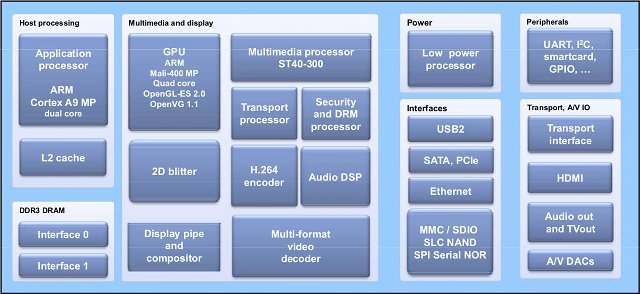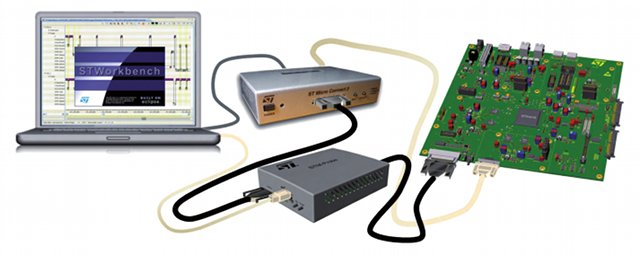STMicro announced STiH416 SoC for media players at CES 2012 with very few details, but we’ve still known that it is a dual core Cortex A9 @ 1.2 GHz coupled with a quad core Mali-400 manufacturer and an hardware video decoder supporting commonly used codecs such as H.264, VC-1, AVS and MPEG2. Yesterday they put out a press release about a STB development platform based on this solution, and I found out we’ve got much more information now.

Key features include:
- ARM Cortex-A9, dual core CPU, SMP NEON SIMD engine yielding up to 6000 DMIPS
- ARM Mali-400 quad core GPU yielding up to 1600 Mpixels/s fill rate and supporting up to 1080p60 or 1080p30 stereoscopic 3D graphics
- Dual HD H.264/VC-1/AVS/MPEG2 video decoder or SVC video decode
- MVC video decode for 3DTV: supports up to 1080p60L/60R, 3D video formats
- Dual HD internet video decoding: real video 8/9/10, DivX, Xvid, MP4p2, Adobe Flash videos
- Single HD internet video decoding: WebM/VP8
- H.264 video encoder up to 1080p60 HD resolution with video preprocessing; deinterlacing, HQ resizing and TNR
- High-quality of image with Faroudja video
- ST proprietary multicompartmental security IP and DRM processor.
- Dual audio DSP: supports Dolby MS11.
- Interfaces – 4x USB 2.0, 2x eSATA, PCIe, 2x Ethernet (GbE capable), MMC / SDIO, SLC NAND, SPI serial NOR, and DDR3 memory interface.
- Video I/O – HDMI 1.4a, audio and TV out.
- Integrated low power processor: < 30 mW passive standby mode.
The media and connectivity capabilities of this SoC allows for multiple screens in the home controlled from one set-top box.

For development purpose, the company provides “STLinux Development Environment” includes the following:
- STLinux – Linux kernel, device drivers and a root file system populated with over 800 packages. STLinux is compatible with higher level driver sets such as STAPI and STKPI drivers for audio/video and SDK2/Android.
- STWorkbench – Eclipse-based IDE providing support for building, downloading, debugging
and managing STLinux systems, as well as SDK2 and Android applications. Available for Linux and Windows. - GNU Development Tools – C and C++ compilers, glibc and uclibc runtime libraries and both user and kernel space GDB debuggers.
- ST Micro Connect – Host-target interface products that support fast code download, robust JTAG debug and a serial relay interface. Two products are available:
- STMC2 – Multi-core debugging across an ARM or ST40 core running STLinux and companion cores.
- STMCLite – Low cost USB to JTAG interface for STLinux application debug only.
- STM-Probe – Tool to capture system trace diagnostics from the target. The captured data
can be analyzed under STWorkbench to show CPU loading, thread synchronization and inter-core communications. - OS21 RTOS Micro Toolsets – ST Micro also provides a set of Micro Toolsets that allow users to develop and debug OS21-based RTOS applications on the companion ST40 and ST200 processor cores.
The STLinux kernel and associated packages, GNU development tools, STWorkbench and RTOS Micro Toolsets can be downloaded from STLinux.com. You’ll also find documentation, FAQs, on the site, and STMicro provides support via Bugzilla bug tracking system. Read the brochure for a longer overview of the development environment. I understand that the media libraries (e.g. STAPI) are not available publicly, so you’ll have to contact the company or a distributor, and buy a license in order to get those.
The company can also provide reference boards together with their Board Support Packages (BSPs), but I could not find details about those hardware platforms.
You may be able to find further information on ST STiH416 page.

Jean-Luc started CNX Software in 2010 as a part-time endeavor, before quitting his job as a software engineering manager, and starting to write daily news, and reviews full time later in 2011.
Support CNX Software! Donate via cryptocurrencies, become a Patron on Patreon, or purchase goods on Amazon or Aliexpress. We also use affiliate links in articles to earn commissions if you make a purchase after clicking on those links.





is it somehow related to the failure of ST-Ericsson Nova Thor? That they closed ST-E and now release Nova Thor successor under they own brand (just without cellular part which was probably input of Ericsson into ST-E joint venture)
@renw0rp
ST has done media processors for many years. ST-Ericsson venture was just to work on mobile application processors, so I believe the 2 entities are unrelated.
We’re getting spoiled for choice these days, what with the dual cores, quad cores, single core SoC’s.
This one doesn’t have VGA though, which is a bummer, but the good news is its yet another MALI gfx core, so hopefully the LIMA drivers will get more effort put into them.
A10 + Libhybris didn’t look too bad though, although I need to get that up and running to test properly. You got any further on that?
@Lawrence
I haven’t fixed my Cubieboard yet, and this will take at least one month, so I may give it a try on the Mele A1000 instead.
@cnxsoft
ST STB SoC are completly independant
THe STHi416 can decode 4 HD stream at a time
This is a full secured SoC you can not hope this for the A10 & co
And what does not show your diagram is that the STHi416 have 4 other core 1 SH4 ST40 and 4 ST231 so the ARM Cortex-A9 is just focused on the application
Interesting to see someone make a chip actually intended for multimedia set top boxes, sign of the times with Arm slowly pushing out Sigma Designs traditional MIPS based devices.
However to get major design wins they need to to provide a turnkey solution, it’s not enough to make the hardware and SDK and you have to build the entire thing practically so a licensee just sticks their branding on the media player front end and sells it as their own, that’s what Sigma provide for Western Digital, Popcornhour and so on.
STMicro would need to have a capable media player front end, they could build their own or use XBMC under linux (the best option really) as it’s flexible enough to be customized for most purposes but does have GPL obligations that must be adhered to.
The lazy option would be to fall back on Android and just tie their hardware decoders into Android XBMC.
@Dan
That’s why we provide such turnkit
@Lawrence
You can use A10 with X11 or FB, Tom Cubie got us binary drivers for that. Lima only just now is entering the initial Mesa implementation phase.
@Luc Verhaegen
Is it possible to look on mesa lima integration somewhere ?
@m][sko
Nope, nothing real to show so far. As soon as something useful is out, it will be found in the gitorious lima tree.